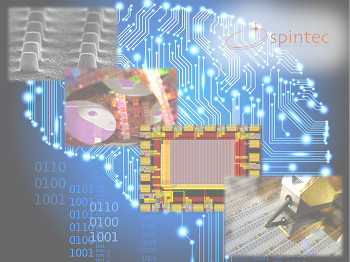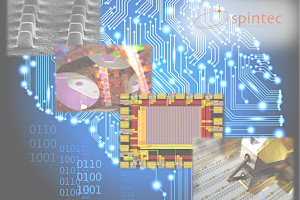
Spintec
Positioned at the crossroad of science and technology, SPINTEC (SPINtronique et TEchnologie des Composants, https://www.spintec.fr) is one of the leading spintronics research laboratories worldwide. SPINTEC was created in 2002 and rapidly expanded to currently reach 100 peoples, of which 43 permanent staff from CEA, CNRS and Grenoble-Alpes University. The lab aims at bridging the gap between fundamental research and applications in spin electronics. As such, the outcome of the laboratory is not only scientific publications and communications at international conferences, but also a coherent patent portfolio and implementation of relevant functional demonstrators and device nanofabrication. The lab has launched four start-up companies in the past 12 years. This synergy has placed SPINTEC at the forefront of spintronics research, having actively contributed to the emergence in industry of spintronic memories called MRAM, on which the laboratory holds key patents.
SPINTEC benefits from an idea local environment with a large spectrum of opportunities:
- SPINTEC belongs with the Interdisciplinary Research Institute of Grenoble (IRIG), gathering 10 laboratories with of total of 1000 researchers, technicians, doctoral and post-doctoral students. IRIG covers interdisciplinary skills (physics, chemistry, biology), and provides access to cutting-edge scientific and technological platforms such as PTA cleanroom, and nano-characterization PFNC.
- The Giant Campus Site (also called Scientific Presqu’Ile) offers an exceptional scientific environment with partners such as CEA-LETI, Néel Institute and major European facilities (ESRF and ILL on the EPN Campus).
- The entire Campus of Grenoble Alpes University, whose excellence was recently recognized by the national IDEX award, bears a collective dynamics of research challenges in all fields of knowledge.
Grenoble is a cosmopolitan city at the heart of the French Alps. One out of five people living there works in the field of research, innovation or higher education. In addition, Grenoble offers various cultural and sportive opportunities all year round.
Spintronics for artificial intelligence
Artificial intelligence (AI) is playing an increasing role in our information and communication society. It is particularly suited for specific tasks such as pattern recognition or data mining, which are inefficiently performed with traditional Von Neumann computers. Neuromorphic computing uses brain-inspired components and principles for the design of circuits that can handle this type of tasks with much better power efficiency than conventional computers. Grenoble is one of the most active places in France and Europe in core AI areas – machine learning, perception, speech communication, computer vision and embedded AI and has an ecosystem able to provide the necessary hardware/software continuum by creating dedicated systems for AI. Grenoble area includes major academic actors in hardware design, hardware / software acceleration and distributed computing. This excellence in AI was acknowledged by the creation of a dedicated institute (MIAI for Multidisciplinary Institute in Artificial Intelligence), alongside two others and part of the national program for artificial intelligence of research, training and innovation centers. MIAI aims to conduct research in artificial intelligence at the highest level, to offer attractive courses for students and professionals of all levels, to support innovation in large companies, SMEs and startups and to inform and interact with citizens on all aspects of AI.
Spintec is developing spintronics solutions for AI, including within the Grenoble MIAI Institute through the chair “Hardware for spike-coded neural networks exploiting hybrid CMOS non-volatile technologies”. SPINTEC wants to further enhance its footprint in the field, and create a transverse AI research group, which will cover various activities from theory, nanofabrication, to integrated circuit architectures. This research group will be strengthened by the present opening of a permanent Research Scientist position. Indeed, spintronic devices, with their multiple variants, can play a decisive role in this area thanks to their ability to embed logic into the memory design in a very intricate way. The ultimate goal would be to design hardware components able to act intrinsically as neurons and synapses, instead of currently emulating these on standard chips, at the cost of a massive energy consumption. This is how the brain operates with an unrivaled efficiency, with its massively parallel interconnections of neurons and synapses. Neuromorphic computing can be carried out with a variety of spintronic devices or magnetic textures including spintronic memristors, spintronic nano-oscillators, superparamagnetic tunnel junctions, nanomagnets, skyrmions, etc. However, specific ways to make use of these basic components must be conceived, implemented in neuromorphic circuit architectures, benchmarked with alternative approaches and validated in use cases.
Position
We are looking for applicants with already a sound experience in the field of neuromorphic computing, preferably neuromorphic spintronics, covering any of two different profiles (for only one position):
- A digital integrated circuit and architecture design profile: the applicant should be experienced in the design of digital circuits and architectures, particularly suitable for AI. She/He should have hands-on experience with high level HDL languages and tools, simulation and modeling languages, scripting and programming languages (VHDL, Verilog, System Verilog, C/C++, Perl, Matlab, Python, Tensorflow etc.) and mastering of microelectronics design suites (e.g., CADENCE, MENTOR or SYNOPSYS). In case of no background in spin electronics, she/he should have a good ability to adapt to totally new concepts of emerging technologies.
- An experimental profile: the applicant should have experience in unconventional computing based on spintronic devices with practical skills among material characterization, nanofabrication, knowledge in magnetism static and dynamics, knowledge of digital and analog electronics, CMOS/magnetic integration, component-level electronic test.
In both cases, candidates may be engineers with significant experience (4-7 years), and/or PhDs with a post-doctoral experience (2-5 years). The ability to conduct successful research and development activity on targeted topics in a multidisciplinary environment is essential. In an application letter, the candidate should describe how her/his experience and vision would complement and benefit to the long term interest in AI of the host institution, to conduct original research and to have the ability to set and manage research collaborations with academic and industrial partners, while working collaboratively within SPINTEC. Experience with working inside an industrial environment on market components would be valued
Additional information
This offer concerns an indefinite-term position at the French Atomic and Alternative Energy Commission (CEA, www.cea.fr). Offered salary depends on experience. Candidates are requested to send by email a motivation letter and a detailed CV to Lucian Prejbeanu, director of Spintec at lucian.prejbeanu@cea.fr, deadline for application: July 15th, 2020. Selected candidates will thereafter be quickly informed and called for an interview planned in September 2020.

